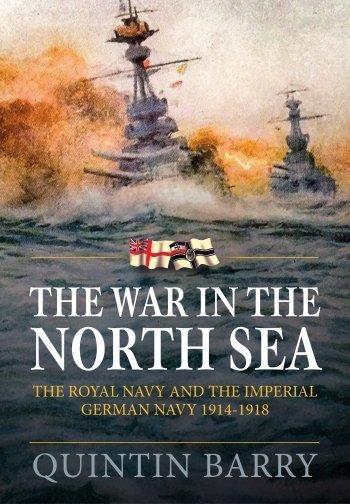-
Załączniki bezpieczeństwa
Załczniki do produktuZałączniki dotyczące bezpieczeństwa produktu zawierają informacje o opakowaniu produktu i mogą dostarczać kluczowych informacji dotyczących bezpieczeństwa konkretnego produktu
-
Informacje o producencie
Informacje o producencieInformacje dotyczące produktu obejmują adres i powiązane dane producenta produktu.HELION
-
Osoba odpowiedzialna w UE
Osoba odpowiedzialna w UEPodmiot gospodarczy z siedzibą w UE zapewniający zgodność produktu z wymaganymi przepisami.
The Royal Navy and the Imperial German Navy 1914-1918
Author : Quintin Barry
General - Pages : 610 | Images : 155 b/w photos, 19 b/w maps & charts
Paperback - Date of Publication : January 2022 | Edition : Reprint | Size : 245mm x 170mm | ISBN : 9781912390540 | Helion Book Code : HEL0947
For years before the outbreak of the First World War, it was the expectation of most officers of the Royal Navy and the Imperial German Navy that very shortly thereafter, a decisive fleet action would be fought. This had a major impact on the strategic thinking on both sides of the North Sea. In fact, the unalterable geographic situation meant that for the Grand Fleet in its Scottish bases, the correct course to follow was not to seek a major fleet encounter. Essentially, it was by staying where it was that it could neutralise the High Seas Fleet and enforce an economic blockade of Germany. The history of the war in the North Sea between 1914 and 1918 is a record of the attempts to break the deadlock - and it is also the history of the men who led the British and German navies. On both sides, the stresses of the huge burden which they bore led to a serious breakdown of trust in each other on the part of the admirals charged with the responsibility. Still more serious was the mutual loss of confidence between the admirals on the one hand and the politicians on the other; their letters and diaries reveal the bitter personal disputes that arose between them. The principal naval battle of Jutland occurred when the two most powerful fleets that the world had ever known clashed, almost by accident, in the North Sea on 31 May 1916. The outcome of the battle has prompted a minute examination of the tactics employed by the commanders, and a continuous debate as to who won, as well as a bitter controversy between the supporters of Sir John Jellicoe (the commander-in-chief of the Grand Fleet) and Sir David Beatty (the commander of the battle cruisers). Most British historians claim the battle as a British victory - a view which this book questions. It has been often suggested that after Jutland, the High Seas Fleet remained in harbour for the rest of the war, but as this book shows, the underrated Admiral Reinhard Scheer (its commander-in-chief) subsequently launched a number of major sorties. It was a series of chances that had determined the outcome of Jutland - and it was chance that repeatedly intervened to prevent a decisive encounter subsequently. This book reviews the entire course of the war in the North Sea, from the first contacts between the fleets in the early days, to the ambitious (but abortive) mission planned at the end of the war for the High Seas Fleet - and, as a dramatic epilogue, its scuttling in Scapa Flow.
"Certainly a book that will be a valued one on the editorial office bookshelf and is one that will be turned to, time and again…the reviewer most highly recommends." Britain at War
“ … Another Quintin Barry book from Helion&Company, and again it is an excellent one… Everything you could wish to know about WWI in the North Sea is here. The author once again shows how well history can be written. The book itself is a marvel of how to write history correctly and enjoyably.” A Wargamer’s Needful Things
“This is an excellent book...The War in the North Sea follows academic conventions but is accessible to the lay reader: it would be valuable reading to students and professionals alike with an interest in the First World War, naval history more broadly or maritime strategy. This book is a commendable addition to any bookshelf.” Naval Review
“This is a consummate history of the two most powerful navies the world has ever seen.” Military History Monthly
“ … heavily detailed, documented, and most interesting… Barry has found the range and straddled his subject with his first salvo. This book will long stand as a definitive treatment of the Nova War in the North Sea.” Mariner’s Mirror








